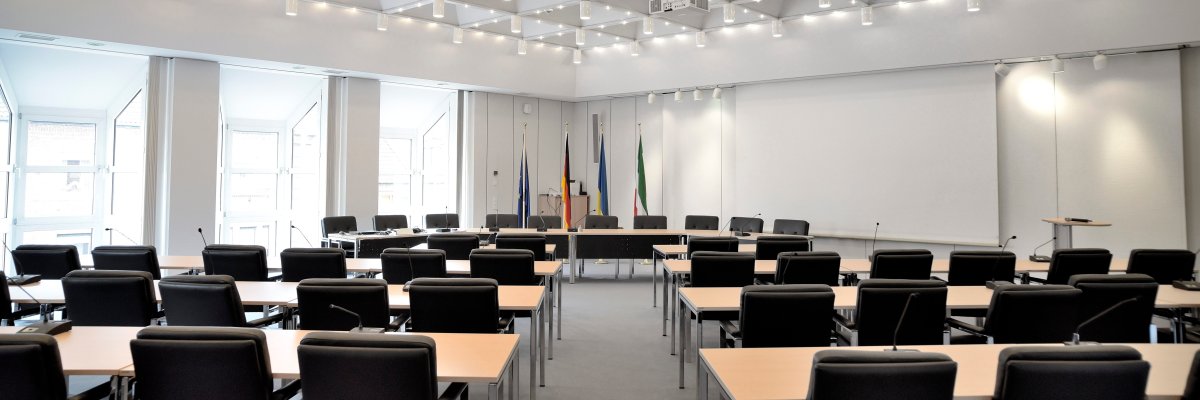Elections
Free elections are a central element of democracy. Citizens actively decide which members of parliament should represent them for a certain period of time. Here you will find an overview of the various elections that take place in Germany.
- Election to the European Parliament
- Election to the German Bundestag
- Election to the NRW state parliament
- Local elections
- District council of the Kleve district
- District Administrator of the district of Kleve
- Council of the pilgrimage town of Kevelaer
- Mayor of the pilgrimage town of Kevelaer
Election dates 2025 to 2029
| Elections to the | Duration of election period | Dates 2025 | Dates 2026 | Dates 2027 | Dates 2028 | Dates 2029 |
| European Parliament | 5 years | ✔ | ||||
| German Bundestag | 4 years | ✔ | ||||
| State Parliament NRW | 5 years | ✔ | ||||
| District council of the Kleve district | 5 years | ✔ | ||||
| District Administrator of the district of Kleve | 5 years | |||||
| Council of the pilgrimage town of Kevelaer | 5 years | ✔ | ||||
| Mayor of the pilgrimage town of Kevelaer | 5 years | ✔ |
Election of the council of the pilgrimage town of Kevelaer
The city council decides on important municipal matters such as urban development, construction projects, public facilities and the municipal budget. It is the city's central political body and plays a key role in determining the city's development. For Kevelaer, the size of the council is set at 34 members. Each person entitled to vote has one vote in the election of the members of the Kevelaer Pilgrimage Town Council, which is used to directly elect a person in the electoral district and to elect the party or voter group's reserve list.
Frequency: Every five years
Eligibility to vote: Germans and nationals of the other 26 EU Member States who have reached the age of 16 on election day, have lived in the electoral area (in the municipality/city or district) since at least the 16th day before the election or are otherwise ordinarily resident and are not excluded from the right to vote.
Election of the mayor of the pilgrimage town of Kevelaer
The mayor heads the city's administration, represents the citizens of Kevelaer together with the council and plays a central role in the implementation of council resolutions. He or she is directly elected by the people of Kevelaer and holds office as a full-time elected official.
Frequency: Every 5 years
Eligibility to vote: Germans and nationals of the other 26 EU Member States who have reached the age of 16 on election day, have lived in the electoral area (in the municipality/city or district) since at least the 16th day before the election or are otherwise ordinarily resident and are not excluded from the right to vote.
Election of the Kleve district council
The district council is the most important political decision-making body in the district of Kleve. It performs tasks that are shared by the towns and municipalities in the district and which would overburden the individual municipalities financially or in terms of processing. It represents the people of the district of Kleve and decides on all matters that are of particular importance to the district.
Rotation: Every 5 years
Eligibility to vote: Germans and nationals of the other 26 EU Member States who have reached the age of 16 on election day, have lived in the electoral area (in the municipality/town or district) since at least the 16th day before the election or are otherwise ordinarily resident and are not excluded from the right to vote.Election of the District Administrator of the Kleve district
The district administrator is the highest administrative manager of the district and coordinates tasks such as development at district level, financial management and cooperation with the towns and municipalities belonging to the district. This person is also responsible for supervising the municipalities belonging to the district and chairing the district council. The next district administrator election will not take place until 2030.
Frequency: Every 5 years
Eligibility to vote: Germans and nationals of the other 26 EU Member States who have reached the age of 16 on election day, have lived in the electoral area (in the municipality/city or district) since at least the 16th day before the election or are otherwise ordinarily resident and are not excluded from the right to vote.NRW state election
The state parliament is the supreme body of political decision-making at state level, elected by the people. The members of parliament elect the Prime Minister, determine the composition of the state government and pass laws at state level. State policy covers areas such as education, police, transport and economic development. The last state election in North Rhine-Westphalia was held on May 15, 2022. Eligible voters in NRW have two votes. The first vote is used to support a specific person from the constituency; the second vote is used to vote for one of the parties running in the state election.
Frequency: Every five years
Eligibility to vote: Germans who are at least 18 years old on election day, have lived in NRW since at least the 16th day before the election and are not excluded from the right to vote.Federal election
Members of the German Bundestag are elected in the Bundestag elections. This is the representative body of the Federal Republic of Germany and its most important legislative body. The Bundestag elects the Chancellor, appoints and controls the Federal Government and decides on national legislation. The members of parliament also decide on the federal budget and the deployment of the Bundeswehr abroad. The last Bundestag election took place on September 26, 2021.
Frequency: Every four years
Eligibility to vote: Germans who have reached the age of 18 on election day, have been resident in Germany for at least three months and are not excluded from the right to voteEuropean election
Members of the European Parliament are elected in the European elections. The European Parliament is the only institution of the European Union that is directly elected by the people. Together with the representatives of the governments of the EU Member States, MEPs shape and adopt new laws and influence important decisions in areas such as the environment, trade and migration. They also approve the EU budget and elect the EU Commissioners. The last European elections in Germany took place on June 9, 2024.
Frequency: Every five years
Eligibility to vote: In Germany, all those who have reached the age of 16, have German or other EU citizenship, are resident in Germany and have also resided in the EU for at least three months and have been entered in the electoral register (for EU citizens) are eligible to vote.

